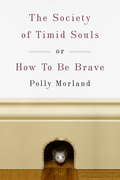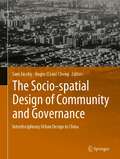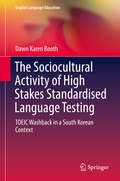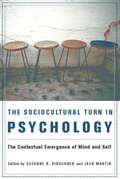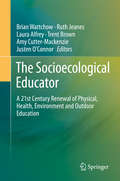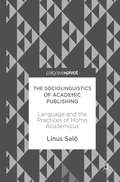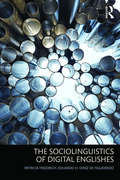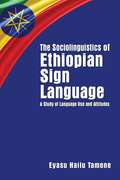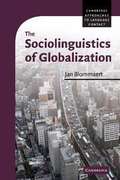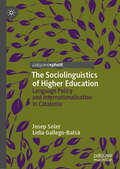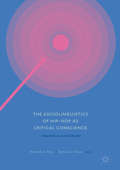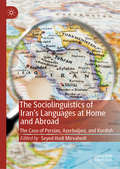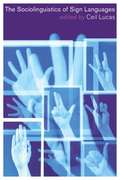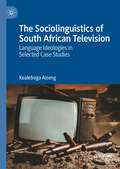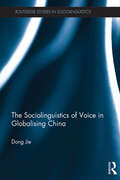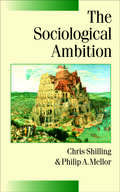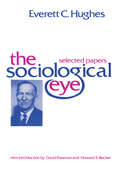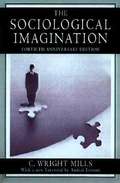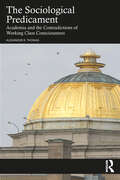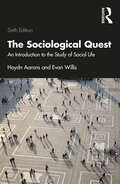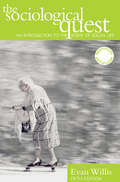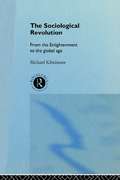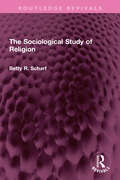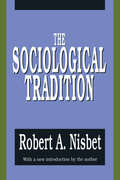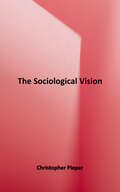- Table View
- List View
The Society of Timid Souls
by Polly MorlandA journey into the modern life of an ancient virtue - bravery - and a quest to understand who might possess it and how With The Society of Timid Souls, or How To Be Brave, documentary filmmaker Polly Morland sets out to investigate bravery, a quality that she has always felt she lacked. The book takes inspiration from a vividly eccentric, and radical, self-help group for stage-frightened performers in 1940s Manhattan, which coincided with the terrifying height of World War II and was called The Society of Timid Souls. Seventy years later, as anxiety about everything from terrorism to economic meltdown continues, Morland argues that courage has become a virtue in crisis. We are, she says, all Timid Souls now. Despite a career in which she has filmed in rebel-held Colombian jungles and at the edge of Balkan mass graves, interviewing convicted murderers, drug-traffickers, and terrorists, Morland herself has never felt brave. Often, the very reverse. So she sets out to discover how and why courage is achieved in an age of anxiety and whether it might even be learned. Drawing on her interviews and encounters with soldiers and civilians, bullfighters and big-wave surfers, dissidents fighting for freedom and cancer patients fighting for their lives, Morland examines bravery across the spectrum: from the first childhood act of defiance by Bernard Lafayette, a leader of the civil rights movement who later faced down the KKK in Alabama, or the reflexive will-to-survive of Vjollca Berisha, a Kosovo Albanian who endured a massacre by playing dead among the bodies of her own family, to the small acts of everyday bravery that quietly punctuate our lives, in schoolyards, labor wards, and hospices the world over. Along the way, Morland draws attention to some of the myths of bravery that have been conjured and perpetuated over time and argues that, often, courage exists as much in the telling as in the doing. At once an exploration of what bravery means and a chronicle of the author's personal journey among those who embody it, The Society of Timid Souls is a profound, approachable meditation on this most valued and mysterious of human qualities. In setting off on the trail of the lionhearted, Polly Morland finds out a great deal about what makes some of us extraordinary, and what of the extraordinary we all share.From the Hardcover edition.
The Socio-spatial Design of Community and Governance: Interdisciplinary Urban Design in China
by Sam Jacoby Jingru Cyan ChengThis book proposes a new interdisciplinary understanding of urban design in China based on a study of the transformative effects of socio-spatial design and planning on communities and their governance. This is framed by an examination of the social projects, spaces, and realities that have shaped three contexts critical to the understanding of urban design problems in China: the histories of “collective forms” and “collective spaces”, such as that of the urban danwei (work-unit), which inform current community building and planning; socio-spatial changes in urban and rural development; and disparate practices of “spatialised governmentality”. These contexts and an attendant transformation from planning to design and from government to governance, define the current urban design challenges found in the dominant urban xiaoqu (small district) and shequ (community) development model. Examining the histories, transformations, and practices that have shaped socio-spatial epistemologies and experiences in China – including a specific sense of community and place that is rather based on a concrete “collective” than abstract “public” space and underpinned by socialised governance – this book brings together a diverse range of observations, thoughts, analyses, and projects by urban researchers and practitioners. Thereby discussing emerging interdisciplinary urban design practices in China, this book offers a valuable resource for all academics, practitioners, and stakeholders with an interest in socio-spatial design and development.
The Sociocultural Activity of High Stakes Standardised Language Testing: Toeic Washback In A South Korean Context (English Language Education #12)
by Dawn Karen BoothThis book explores the influence of high stakes standardised testing within the context of South Korea. South Korea is regarded as a shining example of success in educational achievement and, as this book reveals, pressurised standardised testing has been a major contributing factor to its success. This unique country provides an excellent setting from which to explore the powerful relationship that exists between testing and learning and can advance our understanding of which factors and test conditions will positively and negatively influence learning. This book follows the test activity of a group of Korean university students preparing for the TOEIC (Test of English for International Communication) and posits a revised model of the influence of testing on learning. It calls for a more socially situated view of tests and test-takers considered in relation to the sociocultural, historical, political and economic contexts in which they are embedded.
The Sociocultural Turn in Psychology: The Contextual Emergence of Mind and Self
by Jack Martin Suzanne KirschnerThe sociocultural turn in psychology treats psychological subjects, such as the mind and the self, as processes that are constituted, or "made up," within specific social and cultural practices. In other words, though one's distinct psychology is anchored by an embodied, biological existence, sociocultural interactions are integral to the evolution of the person.Only in the past two decades has the sociocultural turn truly established itself within disciplinary and professional psychology. Providing advanced students and practitioners with a definitive understanding of these theories, Suzanne R. Kirschner and Jack Martin, former presidents of the American Psychological Association's Division of the Society for Theoretical and Philosophical Psychology, assemble a collection of essays that describes the discursive, hermeneutic, dialogical, and activity approaches of sociocultural psychology. Each contribution recognizes psychology as a human science and supports the individual's potential for agency and freedom. At the same time, they differ in their understanding of a person's psychological functioning and the best way to study it. Ultimately the sociocultural turn offers an alternative to overly biological or interiorized theories of the self, emphasizing instead the formation and transformation of our minds in relation to others and the world.
The Socioecological Educator: A 21st Century Renewal of Physical, Health,Environment and Outdoor Education
by Amy Cutter-Mackenzie Justen O'Connor Ruth Jeanes Trent Brown Laura Alfrey Brian WattchowThis volume offers an alternative vision for education and has been written for those who are passionate about teaching and learning, in schools, universities and in the community, and providing people with the values, knowledge and skills needed to face complex social and environmental challenges. Working across boundaries the socio-ecological educator is a visionary who strives to build community connections and strengthen relationships with the natural world. The ideas and real-world case studies presented in this book will bring that vision a step closer to reality.
The Sociolinguistics of Academic Publishing: Language and the Practices of Homo Academicus
by Linus SalöThis book presents a sociolinguistics of academic publishing from an historical and contemporary perspective. Using Swedish academia as a case study, it focuses on publishing practices within history and psychology. The author demonstrates how new regimes of research evaluation and performance-based funding are impinging on university life. His central argument, following the French sociologist Bourdieu, is that the trend towards publishing in English should be understood as a social strategy, developed in response to such transformations. Thought-provoking and challenging, this book will interest students and scholars of sociolinguistics, language planning and language policy, research policy, sociology of science, history and psychology.
The Sociolinguistics of Digital Englishes
by Patricia Friedrich Eduardo H. Diniz de FigueiredoThe Sociolinguistics of Digital Englishes introduces core areas of sociolinguistics and explores how each one has been transformed by the current era of digital communication and the Internet. Addressing the changing dynamics of English(es) in the digital age, this ground-breaking book: discusses the spread of English and its current status as a global language; demonstrates how key concepts such as language change, speech communities, gender construction and code-switching are affected by digital communications; analyzes examples of the interaction of Englishes and social media such as Facebook, Twitter and Urban Dictionary; and provides questions for discussion and further reading with each chapter. Accessible and innovative, this book will be key reading for all students studying sociolinguistics and digital communication or with an interest in language in the globalized multimedia world.
The Sociolinguistics of Ethiopian Sign Language: A Study of Language Use and Attitudes
by Eyasu Hailu TameneEthiopian Sign Language (EthSL) emerged relatively recently; its development is closely tied to the establishment of the first school for deaf students in Addis Ababa by American missionaries in 1963. Today, EthSL is used by more than a million members of the Ethiopian Deaf community, but it remains an under-researched language. In this work, Eyasu Hailu Tamene presents a groundbreaking study of EthSL that touches on multiple aspects of Deaf people’s lives in Ethiopia. Tamene collects data from three principal groups of people: deaf participants, teachers of deaf students, and parents of deaf children. He examines EthSL use within families, in formal and informal settings, and in various community spaces. He documents the awareness among different groups of the services available for deaf people, such as sign language interpreters and Deaf associations. He finds that members of the Deaf community show positive attitudes toward the use of EthSL and investigates the factors that impact those attitudes. His work indicates that there are still critical gaps in recognition and support for the use of EthSL, which can pose a threat to the vitality of the language. The Sociolinguistics of Ethiopian Sign Language will help to advance public understanding of EthSL and contribute to improved educational and social outcomes for the Deaf community in Ethiopia.
The Sociolinguistics of Globalization
by Jan BlommaertHuman language has changed in the age of globalization: no longer tied to stable and resident communities, it moves across the globe, and it changes in the process. The world has become a complex 'web' of villages, towns, neighbourhoods and settlements connected by material and symbolic ties in often unpredictable ways. This phenomenon requires us to revise our understanding of linguistic communication. In The Sociolinguistics of Globalization Jan Blommaert constructs a theory of changing language in a changing society, reconsidering locality, repertoires, competence, history and sociolinguistic inequality.
The Sociolinguistics of Higher Education: Language Policy and Internationalisation in Catalonia
by Josep Soler Lídia Gallego-BalsàThis book investigates the sociolinguistic dimension of the internationalisation of higher education, examining the linguistic tensions and ambiguities experienced by universities around the world, particularly in non-anglophone contexts. Joining current debates within discursive and ethnographic approaches to language policy, the authors analyse the narrative emerging from university language policy documents, and then trace the stance-taking processes of different stakeholders at a small university in Catalonia. They pay particular attention to how teachers, administrative staff, and exchange students position themselves in connection to the role of Catalan and its coexistence with other languages at the university. This book will be of interest to language policy scholars and practitioners, as well as graduate students in sociolinguistics and applied linguistics
The Sociolinguistics of Hip-hop as Critical Conscience: Dissatisfaction and Dissent
by Damian J. Rivers Andrew S. RossThis book adopts a sociolinguistic perspective to trace the origins and enduring significance of hip-hop as a global tool of resistance to oppression. The contributors, who represent a range of international perspectives, analyse how hip-hop is employed to express dissatisfaction and dissent relating to such issues as immigration, racism, stereotypes and post-colonialism. Utilising a range of methodological approaches, they shed light on diverse hip-hop cultures and practices around the world, highlighting issues of relevance in the different countries from which their research originates. Together, the authors expand on current global understandings of hip-hop, language and culture, and underline its immense power as a form of popular culture through which the disenfranchised and oppressed can gain and maintain a voice. This thought-provoking edited collection is a must-read for scholars and students of linguistics, race studies and political activism, and for anyone with an interest in hip-hop.
The Sociolinguistics of Iran’s Languages at Home and Abroad: The Case of Persian, Azerbaijani, and Kurdish
by Seyed Hadi MirvahediThis book examines the sociolinguistics of some of Iran’s languages at home and in the diaspora. The first part of the book examines the politics of minority languages and the presence of hegemonic discourses which favour Persian (Farsi) in Iran, exploring issues such as language maintenance and shift, linguistic ideologies and practices among Azerbaijani and Kurdish-speaking communities. The authors then go on to examine Iranians’ linguistic ideologies, practices and (trans)national identity construction in the diaspora, investigating both the challenges of maintaining a home language and the strategies and linguistic repertoires employed when constructing a diasporic identity away from home. This book will be of interest to students and scholars of minority languages and communities, diaspora and migration studies, and language policy and planning.
The Sociolinguistics of Sign Languages
by Ceil LucasThis is an accessible introduction to the major areas of sociolinguistics as they relate to sign languages and deaf communities. Clearly organized, it brings together a team of leading experts in sign linguistics to survey the field, and covers a wide range of topics including variation, multilingualism, bilingualism, language attitudes, discourse analysis, language policy and planning. Each chapter introduces the key issues in each area of inquiry and provides a comprehensive review of the literature. The book also includes suggestions for further reading and helpful exercises.
The Sociolinguistics of South African Television: Language Ideologies in Selected Case Studies
by Kealeboga AisengThis book explores the interwoven relationship between language, media, and society in post-Apartheid South Africa. The author examines selected case studies from the sociolinguistic landscape of South African television, analysing dominant language ideologies and illuminating the challenges, opportunities, and potential for transformation. He argues for the power of television in shaping language ideologies, fostering cultural understanding, and advocating for more inclusive and equitable language usage in the media. This book contributes to the field of sociolinguistics by emphasizing the complexity of multilingualism in South Africa and inviting ongoing exploration and dialogue in this landscape. It will be of interest to students and scholars of Sociolinguistics, Media Studies, African Culture and History, and Language Policy and Planning.
The Sociolinguistics of Voice in Globalising China (Routledge Studies in Sociolinguistics)
by Jie DongThis book deploys and develops the notion of voice in an investigation of China’s rapidly reshuffling society. The book is structured around two aspects of the voicing process in contemporary China: (1) stratification of voice, which addresses the stabilizing condition of voice; and (2) restratification of voice that draws attention to the dynamics of the system of which the order is reshuffling and not yet apparent. This structure allows us to unveil the hidden forces played out in the voice making process and to stratifying and re-stratifying process of contemporary Chinese society in which some people are making themselves heard whereas others are losing voice. Despite its importance and usefulness, voice has been under theorized in recent decades. The ambitions of this book therefore are to invest serious efforts in developing the notion and to position it in the center of the theoretical toolkits available to students and scholars within and outside sociolinguistics.
The Sociological Ambition: Elementary Forms of Social and Moral Life (Published in association with Theory, Culture & Society)
by Chris Shilling Philip A. Mellor`The Sociological Ambition is a superb book... It is beautifully written, expertly edited and renders complex and original ideas entirely accessible... This is a modern classic' - Journal of Contemporary Religion `For all social scientists who are fed up with corporate-style textbooks, which appeal to the lowest common denominator The Sociological Ambition must come as a relief. Shilling and Mellor have written an account of their discipline but they have done so with a multi-purpose task in mind' - Irish Journal of Sociology In a comprehensive reassessment of the field, Chris Shilling and Philip A Mellor examine the various attempts that have been made to reconstruct sociology over the last century, arguing that classical and contemporary social theories must be studied in relation to the ambition that first shaped and established the discipline. The authors begin by situating sociology in its historical, philosophical and theological contexts; examining how the founders of the discipline developed competing analyses of the processes elementary to social and moral life through their unique contributions. The result is a landmark work in recent sociological study. Accomplished and erudite, this book will be required reading for students of sociology, social theory, religious studies and cultural studies.
The Sociological Eye
by Florian ZnanieckiThis major expression of one of the leaders of the Chicago School, one of the most important schools of thought in contemporary American sociology, includes his recognized masterpieces of sociological research and writing. Hughes pioneered studies in a variety of sociological subjects: social institutions, racial interaction, work and occupations, and research methodology. Cumulatively, these essays show the obvious magnitude and scope of thought of one of the century's most distinguished scholars.In their introduction to this edition, Riesman and Becker provide a biographical background to Hughes' writing, describing his pervading influence on the field of sociology and on younger sociologists through his teaching, fieldwork, work in professional associations, and personality. The essays are grouped into four sections: the relationship of social institutions to changes in their surroundings and to the personalities and careers of persons; problems of multi-ethnic societies; the development of occupations, the monopoly license of professions, the determination of public policy about a line of work, and the relations between work and social role; and social observation and analysis.
The Sociological Imagination
by Todd Gitlin C. Wright MillsThe Sociological Imagination took issue with the ascendant schools of sociology in the United States, calling for a humanist sociology connecting the social, personal, and historical dimensions of our lives.
The Sociological Predicament: Academia and the Contradictions of Working Class Consciousness
by Alexander ThomasA sociological phenomenon afflicts sociology itself: academics think of themselves as the vanguard of the working class despite the fact that they are not working class, as the noble willingness to side with the oppressed contrasts scholars’ reliance on authority to bolster their politics.While there are no simple solutions to this contradiction, a necessary beginning is for sociologists (and other academics) to acknowledge the reality of their own class privilege as members of the professional-managerial class. The Sociological Predicament is then a conscious and deliberate work of professional self-loathing that traces the evolution of ideologies found in academia from the mid-twentieth century to today, which demonstrates the ways in which biases around class have given short shrift to the concerns of working class Americans in deindustrialized cities and towns that have ultimately turned away from and then against them.Intellectuals have not historically been on the side of the oppressed but have been instrumental in developing ideologies that sustain the status quo, and this book crucially asks whether academics’ presence on the left ultimately serves conservative ends.
The Sociological Quest: An Introduction to the Study of Social Life
by Evan Willis Haydn AaronsStarting Sociology can be daunting. This user-friendly introduction takes the reader on a quest towards a sociological understanding of the world we live in. Using contemporary examples, The Sociological Quest asks what is distinctive about the way Sociologists view society. Haydn Aarons and Evan Willis show that they are concerned with the relationships between the individual and society, and that a sociological analysis involves an approach which is historical, cultural, structural, and critical. This sixth edition has been thoroughly revised and updated and includes new material on identities, social change, social movements, populism, climate change, the COVID-19 pandemic, digital interaction, and social media. Also included in the sixth edition is an expanded chapter on empirical research in Sociology and the research process, as well as a new chapter on careers in Sociology.
The Sociological Quest: An introduction to the study of social life
by Evan WillisWhat is sociology? How do you 'do' sociology?Starting sociology can be daunting. This bestselling short introduction takes the reader on a quest towards a sociological understanding of the world we live in. Using contemporary examples, The Sociological Quest asks what is distinctive about the way sociologists view society. Evan Willis shows that they are concerned with the relationship between the individual and society, and that a sociological analysis involves an approach which is historical, cultural, structural and critical.This fifth edition has been thoroughly revised and incorporates new examples on technology, terrorism, climate change and consumer behaviour. It remains essential preliminary reading for new students of sociology.
The Sociological Revolution: From the Enlightenment to the Global Age
by Richard KilminsterBy controversially turning away from the current debates which surround social theory, this book provides an historical analysis of the profound burden of sociology and its implications today.
The Sociological Study of Religion (Routledge Revivals)
by Betty R. ScharfFirst published in 1970, The Sociological Study of Religion distinguishes the sociological from the philosophical or theological approach to religion. It reviews the major theories relating to religious practice to social structure and analyzes the social functions of religion. The contributions of Durkheim, Marx, Freud, Troeltsch and Weber are examined from this point of view, also the contribution of social anthropology, and the studies of religion in industrial societies. This book is a must read for students of sociology and religion.
The Sociological Tradition
by Peretz BernsteinWhen first published, The Sociological Tradition had a profound and positive impact on sociology, providing a rich sense of intellectual background to a relatively new discipline in America. Robert Nisbet describes what he considers the golden age of sociology, 1830-1900, outlining five major themes of nineteenth-century sociologists: community, authority, status, the sacred, and alienation. Nisbet focuses on sociology's European heritage, delineating the arguments of Tocqueville, Marx, Durkheim, and Weber in new and revealing ways.When the book initially appeared, the Times Literary Supplement noted that this thoughtful and lucid guide shows more clearly than any previous book on social thought the common threads in the sociological tradition and the reasons why so many of its central concepts have stood the test of time. And Lewis Coser, writing in the New York Times Book Review, claimed that this lucidly written and elegantly argued volume should go a long way toward laying to rest the still prevalent idea that sociology is an upstart discipline, unconcerned with, and alien to, the major intellectual currents of the modern world.Its clear and comprehensive analysis of the origins of this discipline ensures The Sociological Tradition a permanent place in the literature on sociology and its origins. It will be of interest to those interested in sociological theory, the history of social thought, and the history of ideas. Indeed, as Alasdair Maclntyre observed: We are unlikely to be given a better book to explain to us the inheritance of sociology from the conservative tradition.
The Sociological Vision
by Christopher PieperNew Edition Now Available! What is sociology? Will I like it? Does it matter in the world? Can it help me? The Sociological Vision is designed to answer these questions and cultivate a new way of seeing social life. Geared primarily toward students beginning a journey into the social sciences, or for those with general curiosity for the subject, The Sociological Vision offers a glimpse into the fascinating, revelatory, and occasionally fun world of sociology. Consider it a " sampler platter" for studying human societies and cultures. The book uses a historical approach, a comparative glance, and a critical eye. It shows students how to hone the skills we all have as "armchair" sociologists in observing, describing, explaining, and evaluating the social world in more systematic ways. It encourages readers to ask tough questions about society and themselves. The book emphasizes the individual's role as both participant in society and a recipient of societal influences. Finally, it focuses on how we each build the social order and considers the larger impacts of these small actions.
